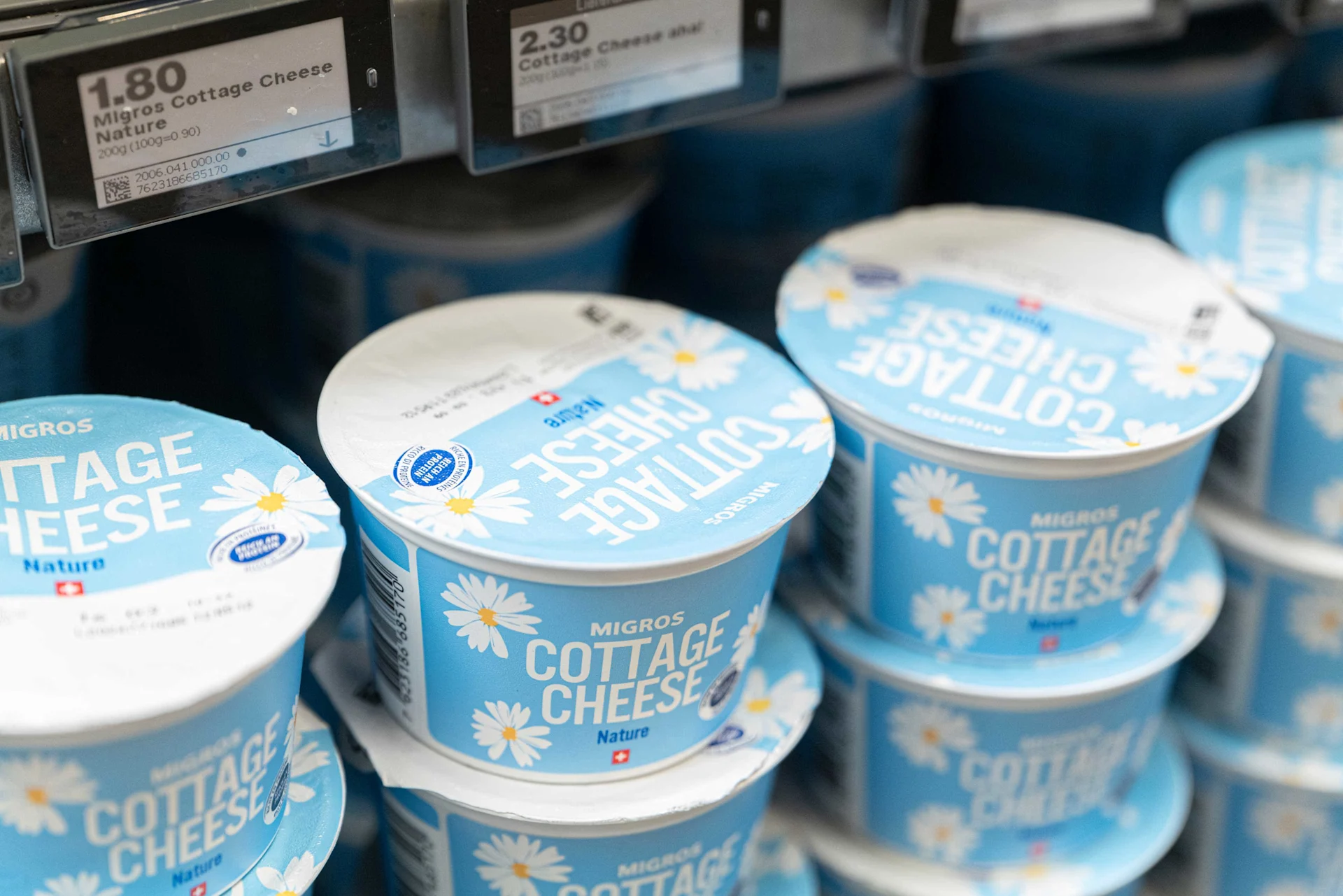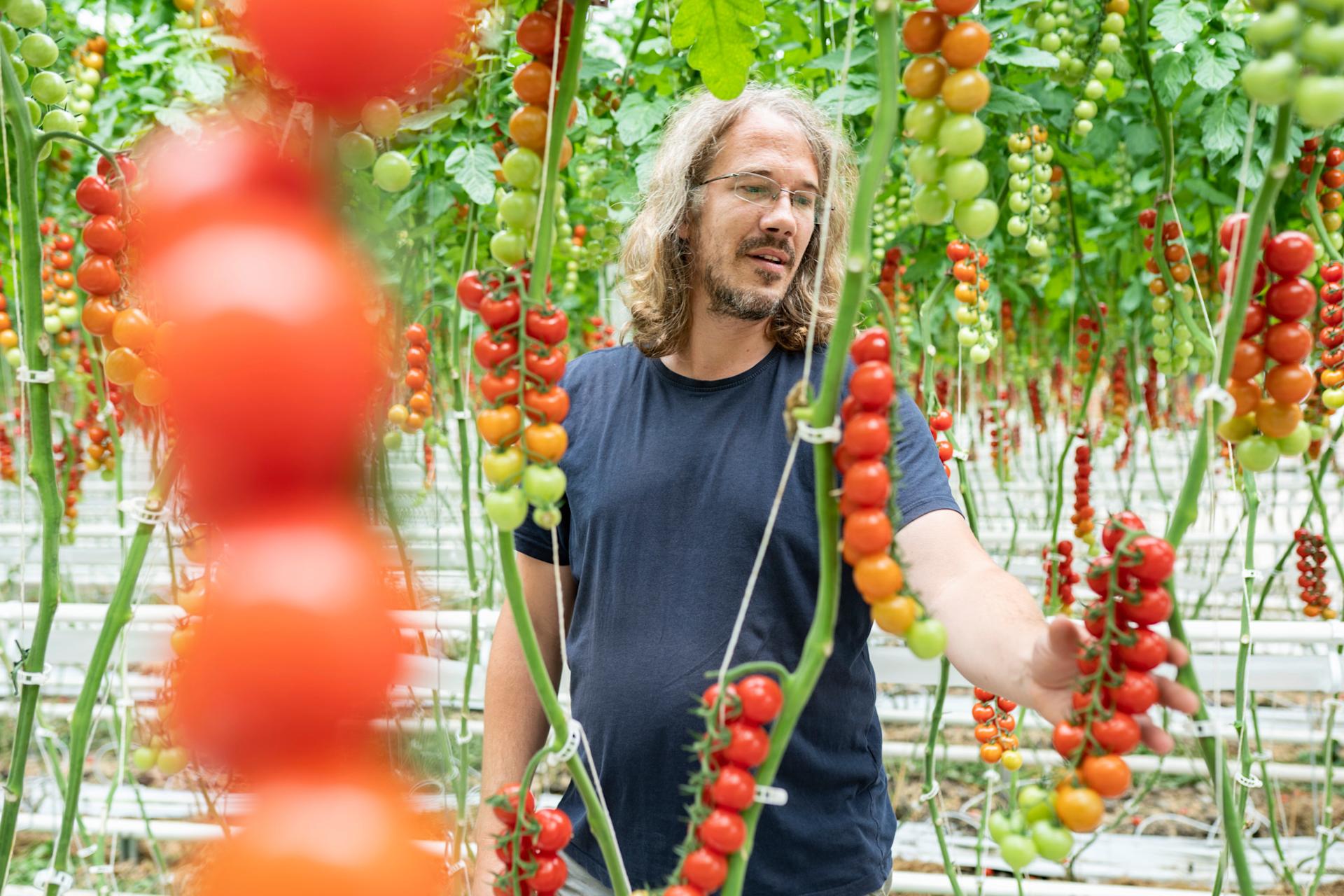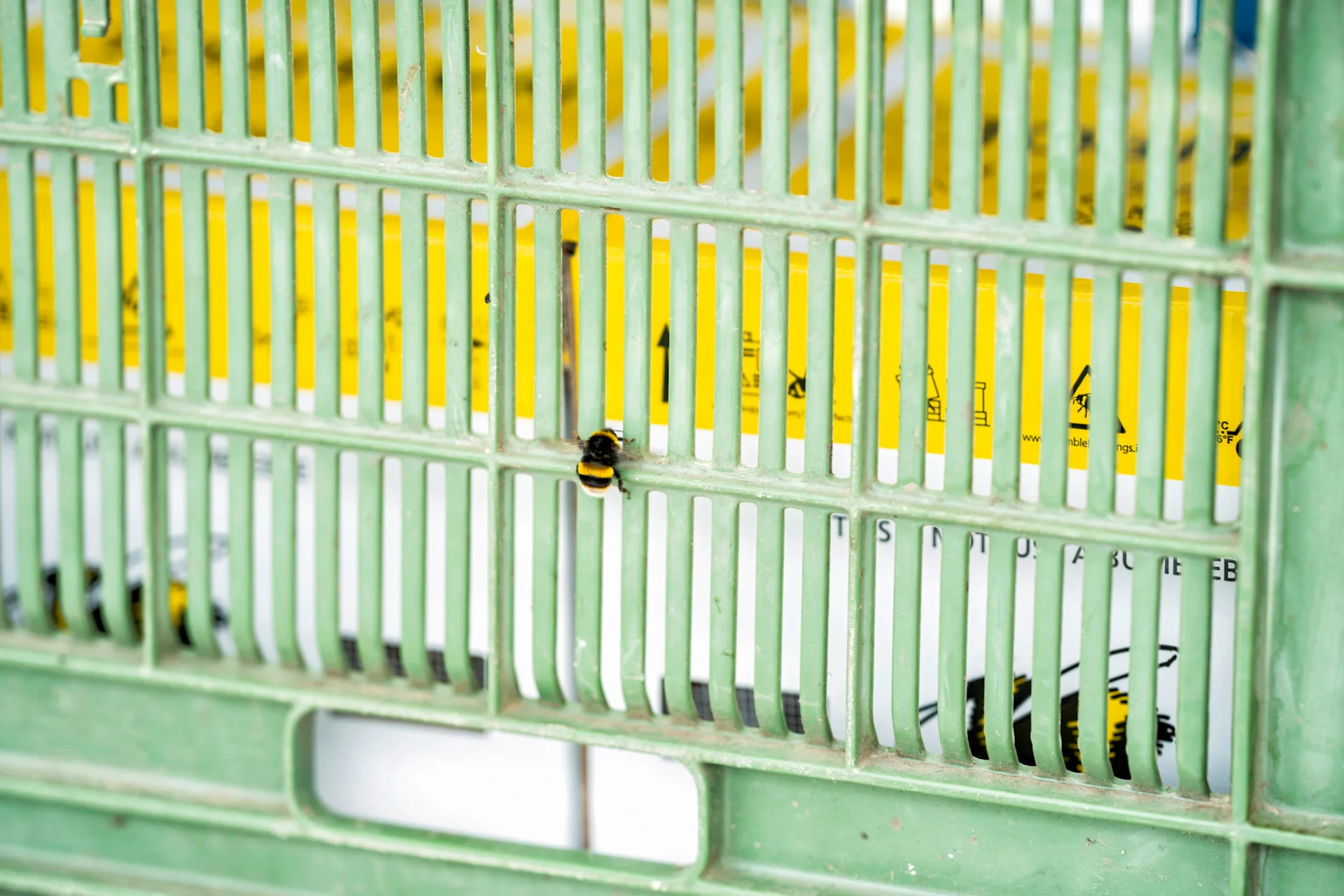
Responsible packaging
Migros is doing all it can to make packaging more sustainable and eco-friendly.
navigation

Vegetable farmer René Sgier
René Sgier grows tomatoes on a large scale in accordance with the strictest sustainability guidelines - in a greenhouse. This is causing heads to turn.
René Sgier is digging his fingers into the ground, is scooping out a handful of soil and is holding it up to the light. “Here - a centipede. And there - a springtail has disappeared.” The 43-year-old is poking the black soil with his index finger. The corners of his mouth are tugging upwards. “That’s a good start,” says the farm manager of Imhofbio AG’s vegetable farm in Schwerzenbach, canton of Zurich. The company produces Demeter vegetables and herbs for Migros on 50 hectares.
Demeter is the agricultural cultivation method with the strictest guidelines of all, stricter than organic. It aims to bring to people, animals, plants and soil into harmony. A biodynamic Demeter farm should produce only as much as the available resources allow. Fertilisers, for example, are strictly regulated, artificial ones are not even allowed, and herbicides are also prohibited. The typical Demeter farm usually houses a few animals, includes some horticulture with fruit and vegetables, and often markets directly to customers. Demeter accounts for just under two percent of the organic share of agriculture, which itself is only 10 percent. Large specialised producers like Imhofbio are rare.
Four years ago, farm manager Sgier switched the large-scale vegetable production from organic to Demeter. And now the soil scientist and production horticulturist is going one step further. He grows Demeter vegetables in a modern greenhouse. There they have enough warmth and are protected from the rain, which has a positive effect on the yields.
With soil in hand, he stands in his new, ultra-modern greenhouse, which is as tall as a detached house and covers the area of a football field. Here are vines upon vines, tall, with a green canopy of leaves. Vines full of tomatoes hang down in green, orange, light and dark red. Every week, up to 4,500 kilos of Demeter cherry tomatoes on the vine leave the modern greenhouse to be sold in Migros.
The cultivation is intensive. The tomato plants, which bear about six vines with up to 16 tomatoes, need a lot of nutrients.
Is that even possible, intensive large-scale cultivation at the most sustainable standard? “It’s not a contradiction,” says the Demeter advocate. Even if he feels a headwind. For example, smaller Demeter farmers worry about the credibility of the label and the prices, and he sometimes hears from customers that biodynamic agriculture is esoteric. Sgier has a clear response for the critics: “Demeter is a label, not an ideology. It is the most sustainable of all farming approaches, and I am happy to subscribe to it.” This must also be possible on large areas, says Sgier, who is now also on the board of the label association. He wants to prove that it is possible - scientifically and economically.
“Demeter is a label, not an ideology. It is the most sustainable of all farming approaches, and I am happy to subscribe to it.”
Of course, it’s not that easy. Sgier’s main challenge is to supply the soil with enough nutrients to keep the quality of his vegetables consistently high and at the same time to always be able to deliver the desired quantity - and this in the long term. “So that next season I won’t only produce small lettuces because the soil won’t yield enough.”
He spent a whole winter planning with experts in biodynamic agriculture how he would have to supply his soil and adjust the crop rotations to make it work. “To cover all our nutrient needs, we would have to have the manure of 300 cattle,” says Sgier. As a vegetable producer, he does not yet have to keep animals. Nevertheless, as a Demeter producer he is obliged to get 40 percent of the fertiliser from his own farm. “That makes it even more complex, because we have a large proportion of crops that require a lot of nutrients.”
In the greenhouse, the nutrient requirement is even higher than in open field cultivation. Tomatoes in the greenhouse need four times as much “feed” as lettuce in the field because more biomass is produced. Added to that, Sgier has to revitalise the soil. “We have to build up a good humus layer.” Whereas greenhouses usually use substrates for cultivation, his greenhouse was constructed on completely normal loamy arable soil. To bring the organisms inside to life, he distributed 15,000 worms in the spring, among other things. Two for every square metre.
“In the long term, however, we want to cover one hundred percent of the nutrients with our own resources.”
In addition, plants are used. Silaged grass, small green clover pellets and ground yellow field beans: what is fed to the animals in the barn serves as food for humus and soil life in the greenhouse, which in turn feeds the plants. The legumes contain a lot of protein and are good sources of nitrogen. Compost from organic chicken manure and from plant waste is also used. His specialists regularly measure the nutrient content of the soil and the plant sap. He has hired new staff for this purpose and purchased drying ovens and the necessary measuring equipment. “We work with the most modern technology,” he says. If the measurements indicate an emergency, Sgier also sometimes gives classic organic fertilisers and trace elements. “In the long term, however, we want to cover one hundred percent of the nutrients with our own resources.” He does not yet know exactly what the mixture will be. Sgier is not only focusing on the soil, but also on the taste of the tomatoes. This also depends on the nutrients. “And we don’t make any compromises here.”

Sgier dumps the soil in his hand on the ground, picks a bright red fruit and bites into it. “This is my lollipop substitute,” he says and laughs. The plants in the Swiss greenhouse will continue to produce organic tomatoes until November. According to Demeter guidelines, Sgier is not allowed to heat the greenhouse after that until March. The tomato plants are pulled out and composted - together with the strings and clips with which they are tied up. These are made of compostable material. Until spring, Sgier will keep the valuable soil in Switzerland’s most sustainable greenhouse fit for growing lettuce.
Demeter is the oldest international organic label with the strictest standards in natural food production. It goes back to the anthroposophist Rudolf Steiner. The label aims to strengthen holistically - the soil, the plants, the animals and the people. Fertile soils, biodiversity, animal husbandry appropriate to the species and diverse crop rotation are just a few of Demeter’s concerns. In the standards for agriculture, the farm as a cycle plays an important role.
At the end of 2020, 362 farmers with almost 6,000 hectares of land were Demeter-certified in Switzerland.
Migros has greatly expanded the Demeter range in recent months. Demeter cherry tomatoes on the vine from vegetable producer Imhofbio are available in larger Migros branches, as are many other products of Demeter quality. Click here for an overview of the Demeter assortment in Migros.
Discover exciting stories about all aspects of Migros, our commitment and the people behind it. We also provide practical advice for everyday life.